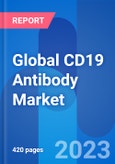Global CD19 Antibody Market & Clinical Pipeline Outlook 2028 Report Highlights:
- Global CD19 Antibody Market Opportunity: > USD 10 Billion By 2028
- Commercially Approved CD19 Antibodies: 10 Antibodies
- Annual, Quarterly & Regional Sales Insight On Approved CD19 Antibodies
- Dosage & Price Insight On Approved CD19 Antibodies
- Comprehensive Insights On CD19 Antibodies In Clinical Trials: > 190 Antibodies
- Global CD19 Antibodies Clinical Trials By Company, Indication & Phase
- Competitive Landscape: Insight On 30 companies
CD19 targeting therapies have emerged as another revolutionary class of immunotherapies in the past decade. These therapies, which consist of monoclonal antibodies, a bispecific antibody, an antibody-drug conjugate and chimeric antigen receptor T-cell (CAR-T) therapies, have captured the attention of both the clinical and commercial spheres in the global pharmaceutical industry. The patient and physician response to these therapies has been favorable as well, which can be gathered from the fact that the market of CD19-targeting therapies increased by almost 50% in 2021, and 40% in 2022. This can be attributed to the rapid regulatory approvals, and the current pipeline of investigational CD19-targeting therapies shows potential for a further surge of this market cap.
CD19-targeting therapies have made a significant impact on the clinical landscape of cancer treatment. They are primarily used for treating B-cell malignancies such as non-Hodgkin lymphoma (NHL) like acute lymphocytic leukemia (ALL), and large B-cell lymphoma (LBCL). The clinical efficacy of these therapies, especially CAR-T therapies like Kymriah and Yescarta, has been remarkable, leading to high response rates and prolonged remissions in a substantial proportion of patients, making them a promising treatment options. However, CAR-T therapies are not without challenges. Cytokine release syndrome (CRS) and neurotoxicity are often associated with CAR-T therapies; however, researchers have found ways to manage these.
Unlike some traditional therapies, CD19-targeting therapies have shown the potential for long-lasting responses. Patients who achieve remission can remain disease-free for extended periods, significantly improving their quality of life. Moreover, CD19-targeting therapies also represent a big step towards personalized medicine. They are tailored to each patient’s unique immune system and the characteristics of their cancer cells, making them a highly individualized treatment.
CD19-targeting therapies have also become a focal point for pharmaceutical companies. The pharmaceutical industry has seen intense competition in the development and commercialization of CD19-targeting therapies. Established giants like Novartis, Amgen, and Gilead have played a significant role but smaller biotech firms are also entering the market now, bringing with them innovative treatments. An example of this is Uplizna, which was developed by Viela Bio, though now a part of Amgen.
At present, nine CD19-targeting therapies have received approval from the regulatory bodies. These are the bispecific antibody Blincyto, the monoclonal antibodies Uplizna and Monjuvi, the antibody-drug conjugate Zynlonta, and the CAR-T therapies Kymriah, Yescarta, Tecartus, Breyanzi, and Carteyva. While the first eight have FDA approvals, Carteyva only has a regional approval in China, where JW Therapeutics markets it.
The continued success of these therapies in the market has been encouraging for the research and development sector of the pharmaceutical market, and as a result, several new CD19-targeting therapies have entered the development and clinical trial pipelines. A majority of these are CD19-targeting CAR-T therapies, which are being developed for hematological cancers such as acute lymphocytic leukemia (ALL) and chronic lymphocytic leukemia (CLL) among other non-Hodgkin lymphomas. This is closely followed by disorders of the immune system, such as autoimmune diseases like systemic lupus erythematosus (SLE) Sjogren's syndrome and systemic scleroderma.
The regulatory bodies have also been instrumental in encouraging the development of CD19-targeting therapies by granting several of them special drug designations. The FDA, for instance, granted the Fast Track designation to KYV-101, IMPT-314 and CABA-201, which have been developed by Kyverna Therapeutics, ImmPACT Bio’ and Cabaletta Bio, respectively. In addition, the FDA also accepted the IND applications of many candidates recently, with the newest being Kyverna’s KYV-101 for the treatment of diffuse cutaneous systemic sclerosis in October 2023.
The market has also seen some collaborations happening lately for the research and development of innovative CD19-targeting therapies, having characteristics unprecedented by the approved CD19-targeting therapies, which are anticipated to give these an edge in the market upon approval. This includes the use of proprietary platforms to help cut down on the cost and time spent in the development of these therapies.
Thus, the market of CD19-targeting therapies is quite vibrant and dynamic, and is currently being driven by several factors. Moreover, as research finds use of CD19-targeting therapies in newer indications, it is obvious that the therapeutic potential of the CD19 protein remains to be fully uncovered. New market entrants have been increasing the competition within the market, which is expected to be one of the major factors driving innovation at present.
Table of Contents
1. Research Methodology2. Approved CD19 Targeting Therapies
Companies Mentioned (Partial List)
A selection of companies mentioned in this report includes, but is not limited to:
- AbbVie
- Aleta Biotherapeutics
- Autolus
- Bristol-Myers Squibb
- Cabaret Biotech
- Cellectis
- Cellular Biomedicine Group
- Chongqing Precision Biotech Co., Ltd
- CRISPR Therapeutics
- Eureka Therapeutics
- EXUMA Biotech
- Fate Therapeutics
- Galapagos NV
- Gilead Sciences
- Gracell Biotechnology
- Guangzhou Bio-gene Technology
- Hebei Senlang Biotechnology
- ImmPACT Bio
- Immvira Pharma
- Innovative Cellular Therapeutics
- Juventas Cell Therapy
- Kite Pharma
- Kyverna Therapeutics
- MedTherapy
- Memorial Sloan-Kettering Cancer Center
- Nanjing Bioheng Biotech
- Nanjing IASO Biotherapeutics
- Poseida Therapeutics
- Precision Biosciences
- Sana Biotechnology








